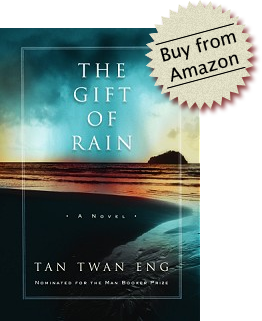Q & A
Q. Who do you identify with the most in the novel?
I identify myself with many of the characters in THE GIFT OF RAIN β from Philip, to Endo, to Michiko and all the other characters. While the novel isn't autobiographical in terms of the plot elements, it does contain many of my views on life, the philosophies which have influenced me, and the questions about life which I often ask myself and wiser people around me. Q. What does Philip Hutton want in life? What is important to him?
Philip wants β like all of us β to find a place to belong to. I think many of us feel that we don't really belong to the society we're in, that we don't fit in. We go through the motions everyday of living our lives, but there's a part of us that feels we ought to be somewhere else, a place where we are fully accepted for what we are and how we think. Q. Were you influenced by other authors or other texts while writing? Which ones?
I wasn't influenced by anyone or any text while actually writing THE GIFT OF RAIN, but I've been an admirer of Kazuo Ishiguro's works for a long time. He has that spare, detached tone in his novels that I like. When I first decided I wanted to be a writer, I thought I would like to write the way he does. But when I began working on THE GIFT OF RAIN, I realized that I couldn't do so, because we're completely different people, with different influences, tastes and viewpoints. Q. What are the lasting effects/ reminders of World War II in Malaysia ?
It's odd that despite what had happened, Malaysians are a forgiving β or forgetful β lot. The people who lived through the Japanese Occupation have died or are growing older now, and the younger people actually have very little knowledge of it. When the UK edition of THE GIFT OF RAIN first came out, many of my friends in Malaysia told me, after reading it, that they hadn't been aware of quite a lot of the events during the war. It's different in the UK and Australia, where the returning veterans have written memoirs and books on the subject. Q. How does the practice of aikido factor in the plot of the book?
Aikido is one of the most complex and sophisticated martial arts I've come across. As I mentioned in the novel, at its highest level it becomes more of a mental exercise than a physical one. I also wanted to use it as a vehicle to carry the Eastern philosophical elements of the novel, using the descriptions of the movements to convey what I wanted to say. By doing so, I could avoid dragging the pace of the novel, or confusing readers who would have found certain concepts confusing.Q. You are a strong proponent for the conservation of heritage buildings in Kuala Lumpur and Malaysia. What prompted this interest and what can be done to staunch the destruction of historically important structures?
My interest is primarily aesthetic β I find these buildings architecturally beautiful, symbolizing a time which can never return. Compared to modern architecture, these old buildings have souls, history, stories. It's hard to staunch the destruction of these structures, especially in Asia, where they're looked upon as icons of colonialism, and the Asian mindset is to have something new and modern. But I suppose by educating people about the intangible value of such buildings we can do something to stop the destruction. A middle way can be found, by preserving these buildings and converting them to suit modern requirements β but something is always lost as well when this happens.
Q. What was the experience like to be long-listed for the Man Booker Prize?
It was wonderful and also surreal. I was a bit tense on the day the announcement was made, and. I had to go out for dinner that evening and I wasn't a very good dinner companion! Halfway through dinner I had a call from a London number which was cut off before I could answer it and this added to my distraction and anxiety. When I got home I found an email from my agent with the word "CONGRATULATIONS!" on the subject heading. And because I wasn't expecting a baby, I knew I was on the list. That night, for the first and only time in my life, I failed to fall asleep. So many thoughts went through my mind and at 4 a.m. I got out of bed and began answering the congratulatory emails that had already started to come in. There was also an element of fear: now my book was out there, brought to the attention of readers around the world.
Q. How did you come to writing novels? How did you balance working as an advocate and solicitor with writing?
I write novels because since I was young I read very widely and extensively. I wanted to be a writer from childhood, because I thought β erroneously! β that it was an easy profession, glamorous, and financially rewarding. I was also fortunate enough to be doing my Masters when I wrote The Gift of Rain. There was no way I could have worked as a lawyer and still write β especially a book like The Gift of Rain, where I had to feel, to immerse myself in emotions and mood. 